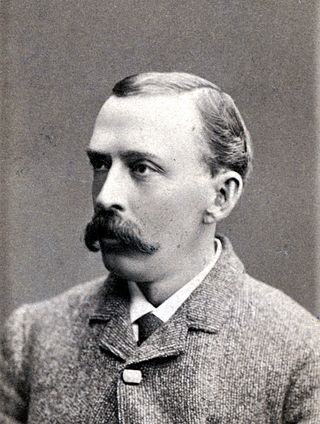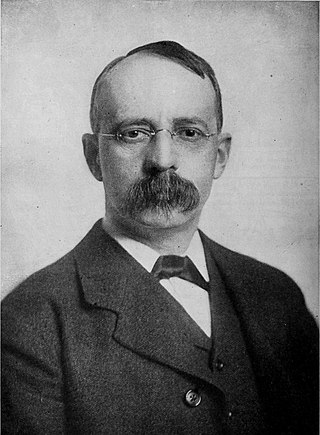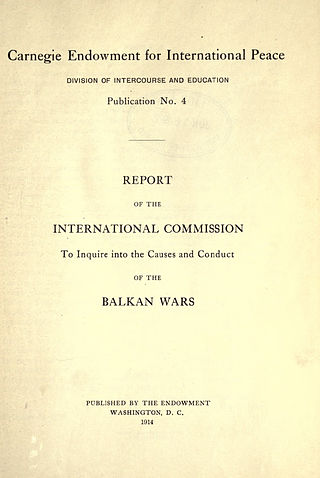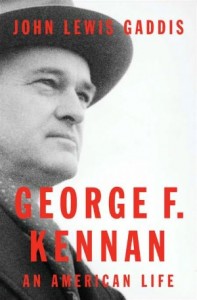
John Lewis Gaddis is an American military historian, political scientist, and writer. He is the Robert A. Lovett Professor of Military and Naval History at Yale University. He is best known for his work on the Cold War and grand strategy, and he has been hailed as the "Dean of Cold War Historians" by The New York Times. Gaddis is also the official biographer of the prominent 20th-century American diplomat and historian George F. Kennan. George F. Kennan: An American Life (2011), his biography of Kennan, won the 2012 Pulitzer Prize for Biography or Autobiography.

George Frost Kennan was an American diplomat and historian. He was best known as an advocate of a policy of containment of Soviet expansion during the Cold War. He lectured widely and wrote scholarly histories of the relations between the USSR and the United States. He was also one of the group of foreign policy elders known as "The Wise Men".

George Kennan was an American explorer noted for his travels in the Kamchatka and Caucasus regions of the Russian Empire. He was a cousin twice removed of the American diplomat and historian George F. Kennan, whose birthday he shared.

Containment was a geopolitical strategic foreign policy pursued by the United States during the Cold War to prevent the spread of communism after the end of World War II. The name was loosely related to the term cordon sanitaire, which was containment of the Soviet Union in the interwar period.

Edward Henry Harriman was an American financier and railroad executive.

The "X Article" is an article, formally titled "The Sources of Soviet Conduct", written by George F. Kennan and published under the pseudonym "X" in the July 1947 issue of Foreign Affairs magazine. It introduced the term "containment" to widespread use and advocated the strategic use of that concept against the Soviet Union. It expanded on ideas expressed by Kennan in a confidential February 1946 telegram, formally identified by Kennan's State Department number, "511", but informally dubbed the "long telegram" for its size.

Princeton University Press is an independent publisher with close connections to Princeton University. Its mission is to disseminate scholarship within academia and society at large.

Yekaterina Konstantinovna Breshko-Breshkovskaya, also known in English sources as Catherine Breshkovsky, was a major figure in the Russian socialist movement, a Narodnik, and later one of the founders of the Socialist Revolutionary Party. She has been described as Russia's first female political prisoner.

Charles "Chip" Eustis Bohlen was an American diplomat, ambassador, and expert on the Soviet Union. He helped shape United States foreign policy during World War II and the Cold War and helped develop the Marshall Plan to rebuild Europe.

Ten Days That Shook the World (1919) is a book by the American journalist and socialist John Reed. Here, Reed presented a firsthand account of the 1917 Russian October Revolution. Reed followed many of the most prominent Bolsheviks closely during his time in Russia.

Marion Hedda Ilse Gräfin von Dönhoff was a German journalist and publisher who participated in the resistance against Nazism, along with Helmuth James Graf von Moltke, Peter Yorck von Wartenburg, and Claus Schenk Graf von Stauffenberg. After the war, she became one of Germany's leading journalists and intellectuals, working for over 55 years as an editor and later publisher of the Hamburg-based weekly newspaper Die Zeit.

The Francis Parkman Prize, named after Francis Parkman, is awarded by the Society of American Historians for the best book in American history each year. Its purpose is to promote literary distinction in historical writing. The Society of American Historians is an affiliate of the American Historical Association.
The following are the Pulitzer Prizes for 1957.
The Sisson Documents are a set of 68 Russian-language documents obtained in 1918 by Edgar Sisson, the Petrograd representative of the United States Committee on Public Information. Published as The German-Bolshevik Conspiracy, they purported to demonstrate that during World War I, Trotsky and Lenin as well as other Bolshevik leaders were agents directed by the German Empire to bring about Russia's withdrawal from the conflict.

The Report of the International Commission to Inquire into the Causes and Conduct of the Balkan Wars is a document published in Washington D.C. in 1914 by the Carnegie Endowment for International Peace.
The New-York Historical Society gives three book prizes annually. From 2005 to 2012, there was one award for American history. A second award was added in 2013 for children's history. A third award was added in 2016 for military history.

The revolt of the Czechoslovak Legion comprised the armed actions of the Czechoslovak Legion in the Russian Civil War against Bolshevik authorities, beginning in May 1918 and persisting through evacuation of the Legion from Siberia to Europe in 1920. The revolt, occurring in Volga, Ural, and Siberia regions along the Trans-Siberian Railway, was a reaction to a threat initiated by the Bolsheviks partly as a consequence of the Treaty of Brest-Litovsk. One major secondary consequence of victories by the Legion over the Bolsheviks was to catalyze anti-Bolshevik activity in Siberia, particularly of the Committee of Members of the Constituent Assembly, and to provide a major boost for the anti-Bolshevik or White forces, likely protracting the Russian Civil War.

George F. Kennan: An American Life is a nonfiction book about U.S. diplomat George F. Kennan by John Lewis Gaddis that won the 2012 Pulitzer Prize for Biography or Autobiography and the National Book Critics Circle Award for biography.
The AHA Prize in European International History, formerly named the George Louis Beer Prize, is an award given by the American Historical Association for the best book in European international history from 1895 to the present written by a United States citizen or permanent resident. The prize was created in 1923 to honor the memory of George Beer, a prominent historian, member of the U.S. delegation at the 1919 Paris Peace Conference, and senior League of Nations official. Described by Jeffrey Herf, the 1998 laureate, as "the Academy Award" of book prizes for modern European historians, it is one of the most prestigious American prizes for book-length history. The Beer Prize is usually awarded to senior scholars in the profession; the American Historical Association restricts its other distinguished European history award, the Herbert Baxter Adams Prize, to young authors publishing their first substantial work. The name was changed in 2024 to "The Prize in European International History."

The British North Russia Squadron was a squadron of the Royal Navy based at Murmansk from 1917 to 1919.

















